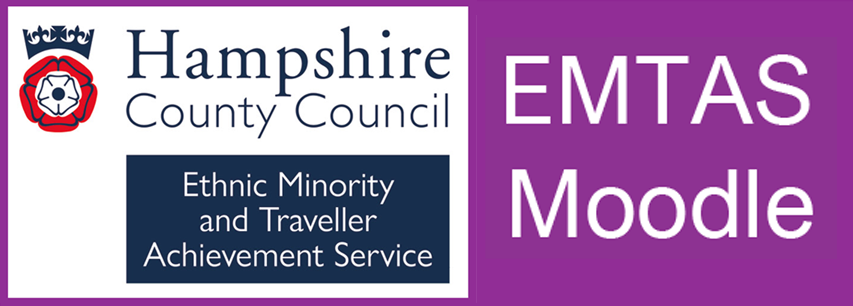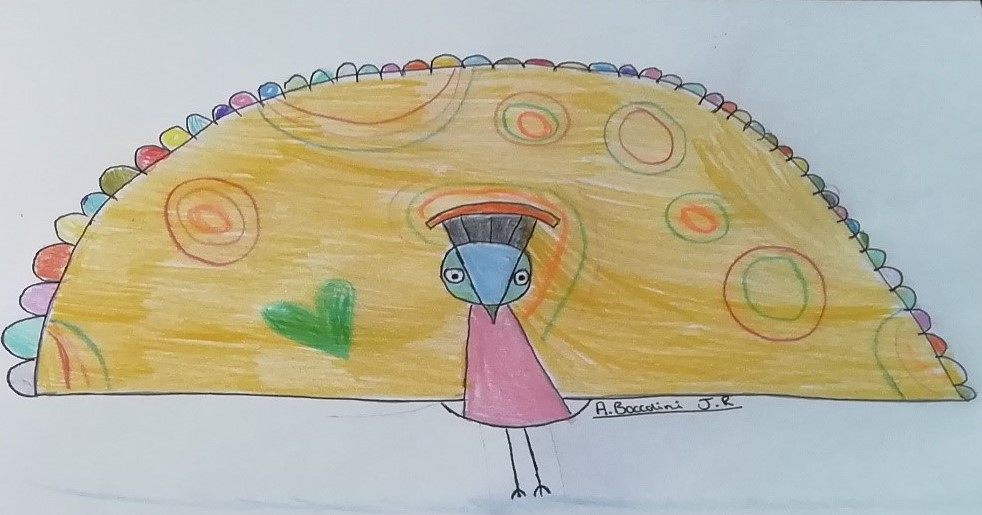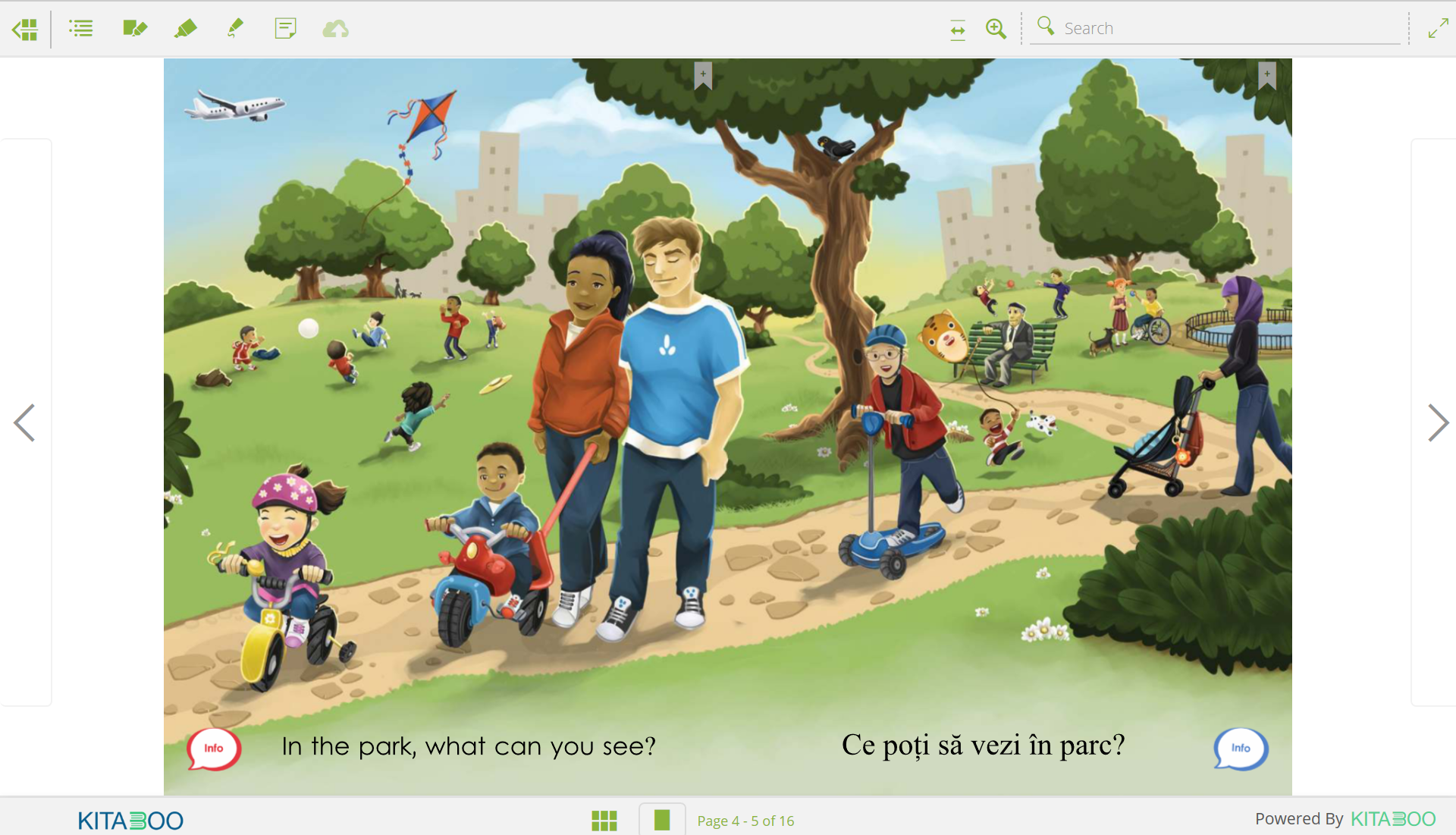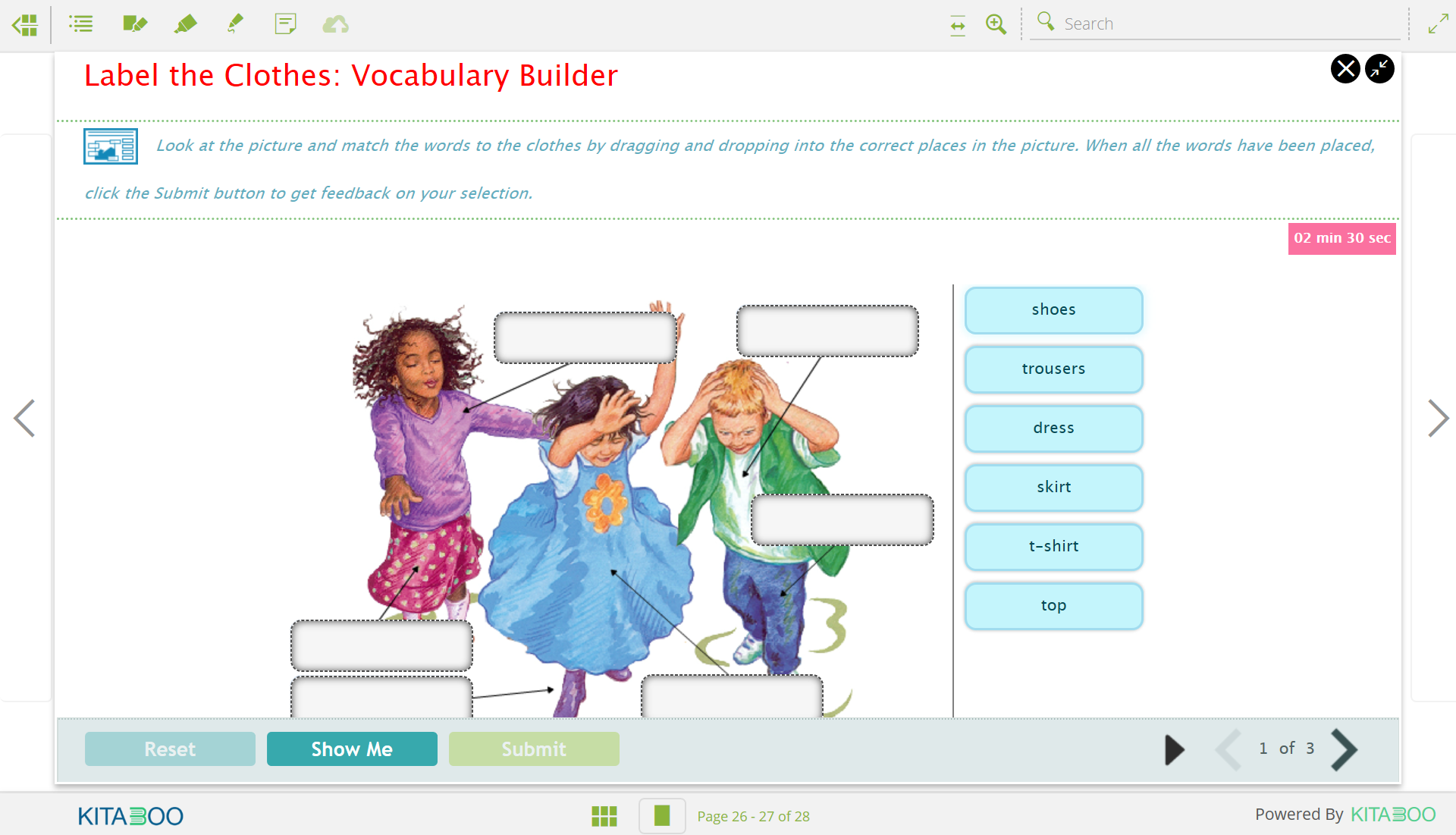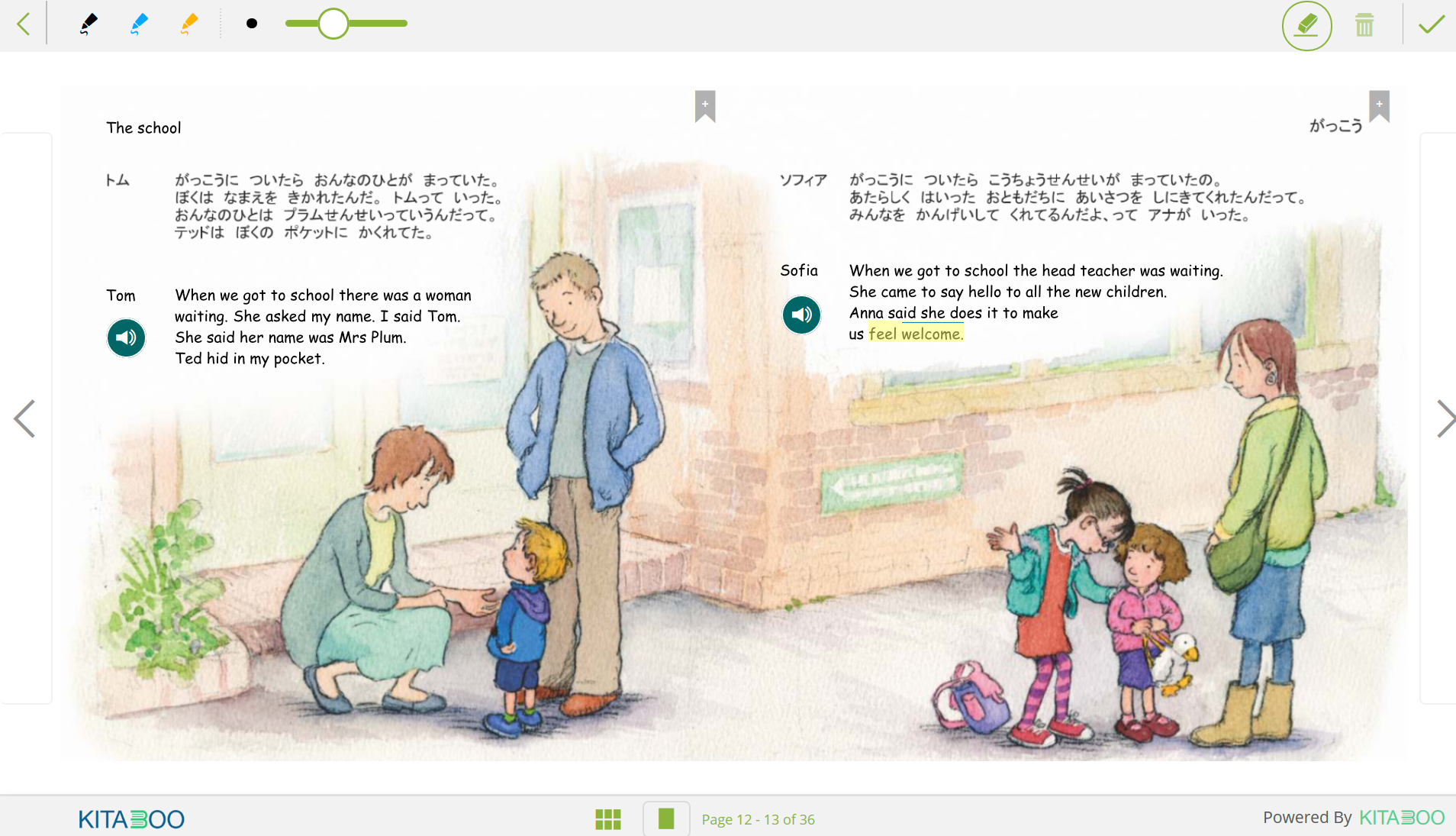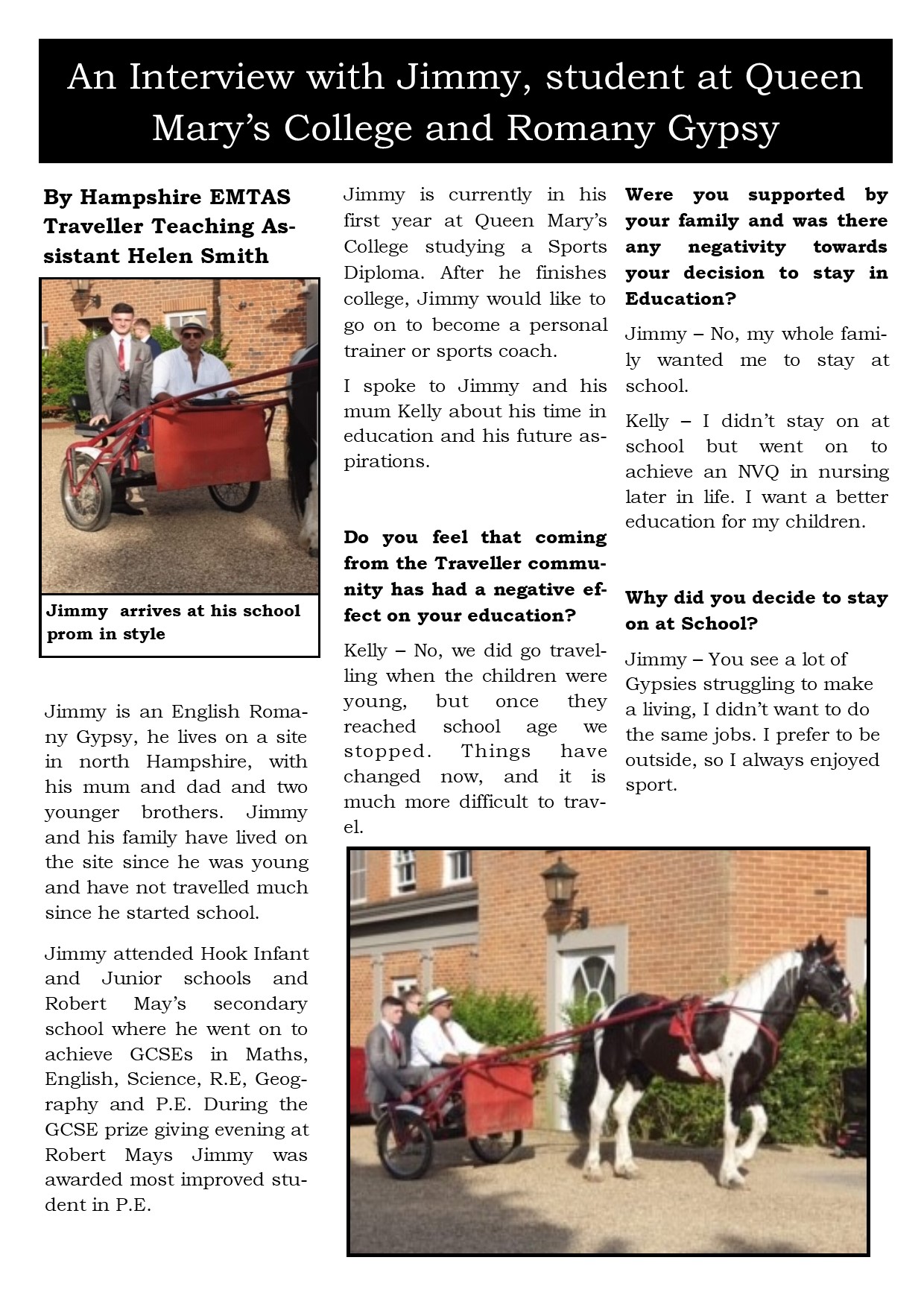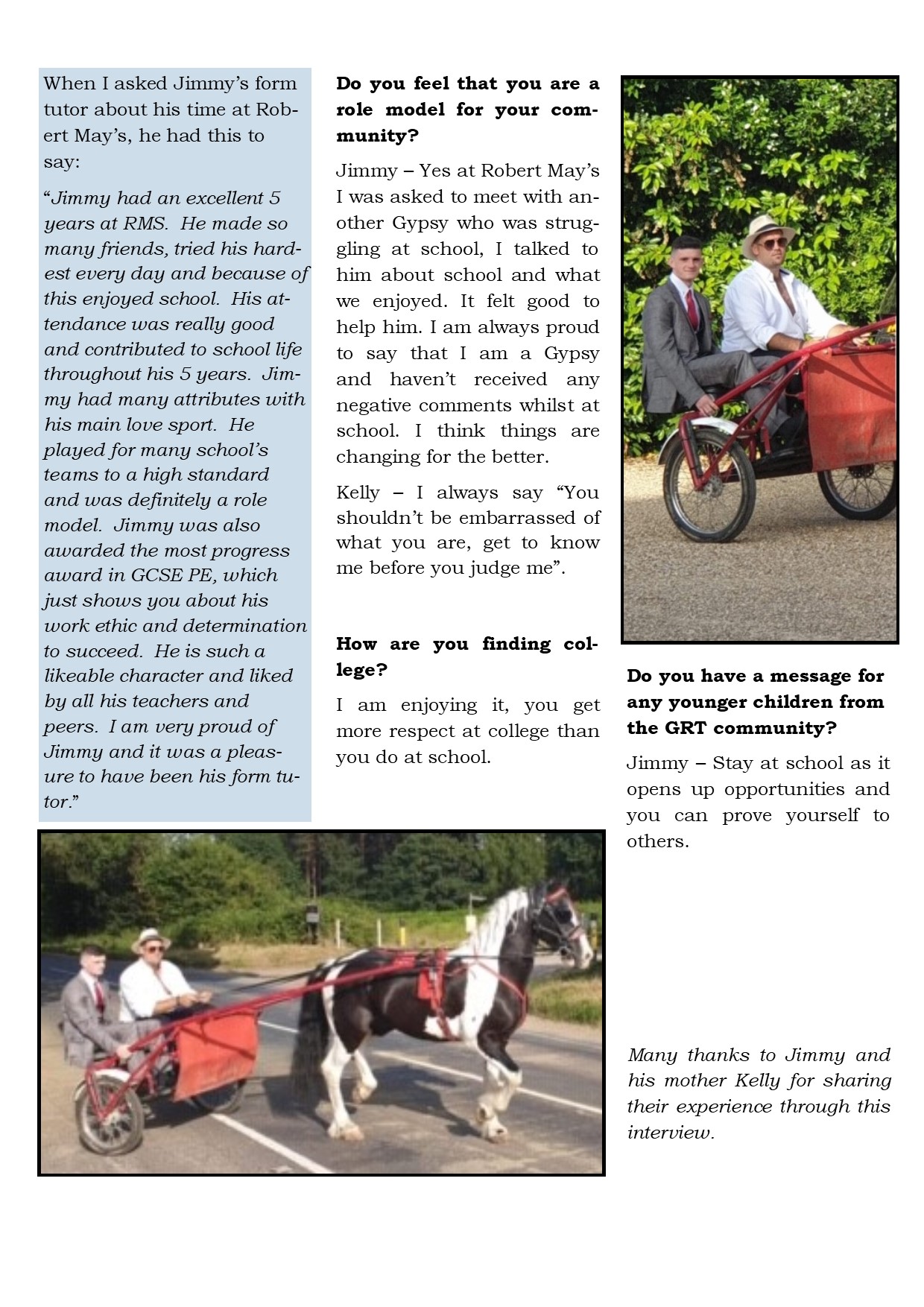Site blog
Anyone in the world
By Rights and Diversity Education (RADE) adviser Minnie Moore

The shocking images on our screens of the death of George Floyd have resonated across the globe and led to many protests and demands for change across all areas of society in addressing and challenging systemic racism which is being characterised as an insidious and pervasive pandemic affecting every institution.
In Hampshire, through our education services, we have strived for many years to address discrimination and prejudice and to promote positive attitudes to difference across all our school communities. We support practitioners to enable them to provide a truly inclusive culture in their settings and there are many opportunities that teachers can access to enable them to continue to reflect on and develop existing practice.
Hampshire schools are in the enviable position of having access to a Rights and Diversity Education centre crammed full of teaching and learning resources which enable practitioners to embed good quality diversity education right across the ethos, environment and curriculum in their schools.
“It is firmly embedded in our staff psyche to source our topics from the RADE Centre as it is a treasure trove of resources and information covering a range of issues associated with rights, diversity and community cohesion in the UK particularly.” Headteacher Hale Primary School
CPD opportunities include training on race equality, diversity, equality teaching, pupil voice, prejudicial behaviour and Rights Respecting education and are all available to book in a range of formats tailored to individual school requirements.
'It was a great session. One of the best training sessions I’ve had to do with school including insets in my own setting.” Assistant Head teacher,Tanners Brook Primary School
We have recently produced a Hampshire Toolkit to support schools in challenging and responding to prejudicial language and behaviour which includes a new tracking form, a pupil survey and a leaflet for parents and carers. This is available to download by clicking on this link (FREE to Hampshire schools, please get in touch for a password).
The Voice of our children and young people is key to informing the work we do to embed inclusive practice across our schools and they have been instrumental in promoting equality and challenging discrimination in their school settings.
 The Equality and Rights Advocates (EARA) is a group of students from
secondary schools across the county who work collaboratively to promote equality
and child rights in their schools, based on the nine protected characteristics
of the Equality Act and the UNCRC. The group has recently expanded to include
primary age children and have been making their voices heard across a range of
different platforms across the county. For more information on the work they do please click on this link. We are always looking for new members so please give your
students the opportunity to get involved!
The Equality and Rights Advocates (EARA) is a group of students from
secondary schools across the county who work collaboratively to promote equality
and child rights in their schools, based on the nine protected characteristics
of the Equality Act and the UNCRC. The group has recently expanded to include
primary age children and have been making their voices heard across a range of
different platforms across the county. For more information on the work they do please click on this link. We are always looking for new members so please give your
students the opportunity to get involved!
For more information on any of the above please contact Minnie.moore@hants.gov.uk.
Visit RADE's website
Contact RADE: Rade.centre@hants.gov.uk
[ Modified: Tuesday, 16 June 2020, 3:43 PM ]
Comments
Anyone in the world
By Hampshire EMTAS Bilingual Assistant Eva Molea
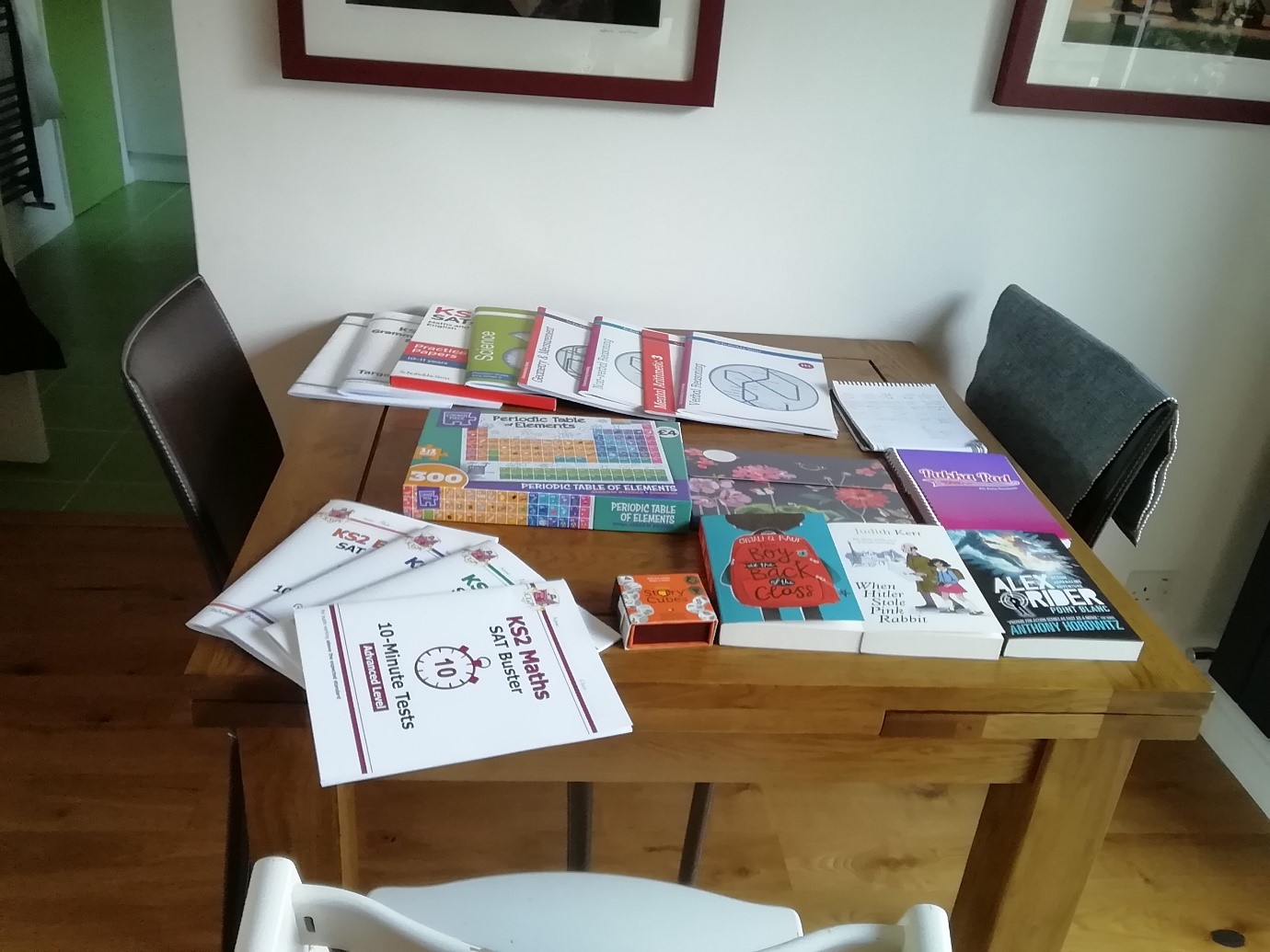
In my Diary of EAL Mum I share the ups and downs of my experience of bringing up my daughter Alice in the UK. After 9 weeks of lockdown and with the happy prospect of school re-opening, I reckon it is time for me to reflect on the last couple of months, especially on the irregular shape that Alice's education has taken.
I would like to start with a big shout out to all teachers, TAs, and school staff in general. You, guys, are my true heroes. Where do you get all your patience from? How can you manage with 30 children, day in - day out for 39 weeks a year, when my own one has driven me round the bend in not even 10 weeks??
Anyway, let's get back on track. When the nation was told that the 20th of March would have been the last day of school for the foreseeable future, I was hit by an education frenzy, so I went to the bookshop and bought:
- as many learning packs as I could possibly carry
- two books that I believed Alice should read (=I wanted to read) and one that she had asked for
- a pack of story cubes
- a notebook as we are always short on paper, and a letter set should she ever feel the need for correspondence
- a jigsaw puzzle of the periodic table of elements
- sketchbook (hoping that Alice would keep a diary of this peculiar period).
Proud of my shopping, I showed it to Alice when she came back from school on the 20th of March, but her reaction was far less enthusiastic than I had expected. I wondered why...
The school had provided her with SATs buster test booklets for maths, SPaG and reading and a grid of activities on Ancient Greece. They had also set tasks on the digital platforms for the children to complete.
On Sunday the 22nd of March, I sat down with my husband (aka the Headmaster) and made a learning plan for the first week: 5 days, 5 subjects per day. I was very proud of my broad and balanced curriculum.
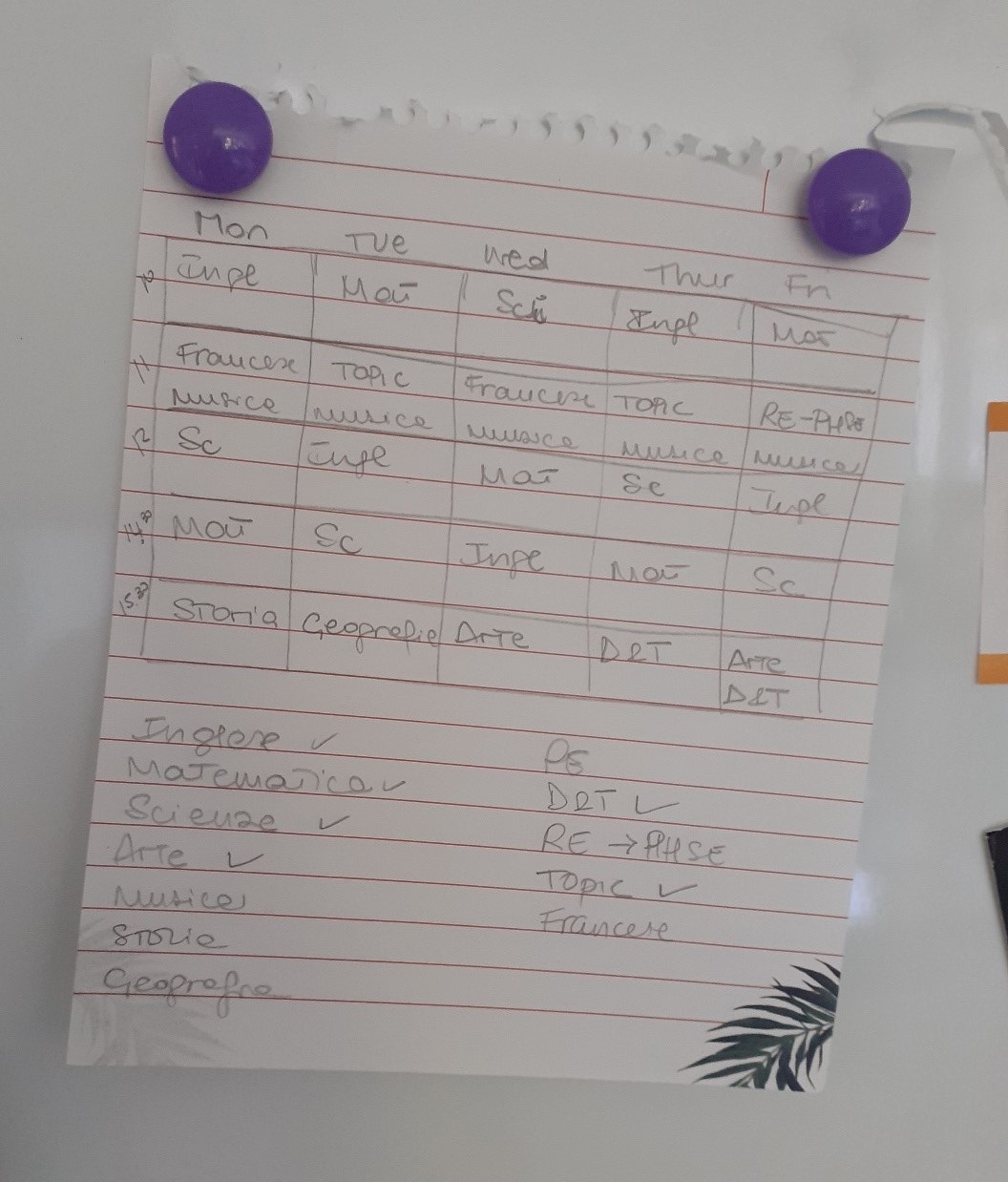
So, on Monday morning, bright and early, we sat down to work. We focused on the booklets and the digital activities and easily Week 1 was out of the way.
On Week 2, having completed all the booklets and digital tasks, we approached the Ancient Greeks grid. I really enjoyed this topic. In Southern Italy, also known as Magna Graecia (Big Greece), Ancient Greek culture had shaped ours well before the Romans, and we learnt the ins and outs of it in school, so it was lovely to be able to share this with Alice. We did some learning on the BBC Bitesize website; we read some myths from books we had brought with us from Italy; we used the story cubes to write Alice’s own myth. But I was not satisfied. So, we had a Greek Day, where we:
- tried to learn Sirtaki, the Greek traditional dance, following some videos on YouTube;
- dressed Alice up as a Greek Goddess (YouTube tutorial);
- learnt the alphabet and the polite words in modern Greek, and looked at how Greek language has influenced most European languages, including English;
- cooked pastitsio and tzatziki, following the recipe that my lovely Greek colleague, Eva P, had recommended. And bought baklava…yum!
This was a great way for the whole family to learn new things and share our knowledge with Alice.
Weeks 3 and 4 of lockdown were the Easter holiday, and my lovely child decided she was not going to touch any schoolbooks and the Headmaster agreed, so I could be off task too and enjoy the sunshine. We did a lot of drawing tutorials on the YouTube channel of the children’s illustrator Rob Biddulph, that are glued in the sketchbook.
Alice devoured one of the books I had bought for her (The boy at the back of the classroom), and tried the other one (When Hitler stole pink rabbit) but found it too hard (or not interesting enough, I’m not sure). Fortunately, dance and gym went virtual that week, so we had enough to keep her entertained. We also played some traditional Italian card games.
Getting back to work on week 5 proved to be quite hard. By then, Alice was feeling very lonely and bored because we did not have the skills to keep her interested and, not to be underestimated, we also had some work to do. But fortunately, the school set more structured homework for the children and we were not sailing in the dark anymore. Having daily work to complete was very helpful, as Alice had some tasks she could carry out independently and ask for the occasional help, whereas when she had to make research on the Internet I was a bit concerned about the appropriateness of content she might come across. For guidance, I also re-read the EMTAS information leaflet on safeguarding and wellbeing which includes online safety .
From week 5 onwards, home learning has been an emotional rollercoaster. We have gone from enthusiastic reactions to some tasks to flood of tears for others, covering all the shades in between. Obviously, had Alice been in school, her learning would have been tailored to her abilities (including the right challenges) and more interesting for her. But I have to say that I really enjoyed learning with her, especially because we all had a very intense EAL experience as we used Italian to investigate, question, explain and reinforce everything and both the Headmaster and I have noticed that Alice’s Italian has improved and her vocabulary has widened, with many new and more interesting words being used. She has also enjoyed listening to audiobooks in Italian and asked me to read to her in Italian at bedtime. EAL parents will be interested in this survey on multilingual language use during the COVID-19 Pandemic.
I pushed my luck and asked her how these 9 weeks had been for her. At first, I got a single word answer: “Boring”. I was expecting that. But then she told me that using Italian for maths had made the subject easier as she still counts in Italian (I didn’t know that), that she felt that her translation skills had improved, and her vocabulary in both languages broadened.
Despite the strangeness of this lockdown period, I really enjoyed playing school with Alice and loved seeing her eyes brighten up when there was something that interested her or when she had finally secured the concepts she was struggling with. But now we all, especially her, can’t wait to get back to school.
PS: The lovely learning packs I had bought have never been touched in these 10 weeks. I will have to force them upon Alice during the Summer holidays…
Visit the Hampshire EMTAS website
Visit our Distance Learning page
Subscribe to our Blog Digest (select EMTAS)
[ Modified: Monday, 22 June 2020, 8:54 AM ]
Comments
Anyone in the world
By the Hampshire EMTAS Traveller Team
Due to current circumstances and the impact on schools of the lockdown, we have decided it would be a good idea to move our celebration of Gypsy, Roma, Traveller History Month (GRTHM) from its traditional month of June to October so no one will miss out on our planned events.
To this end, we are putting on three roadshows across the county. The roadshows will be in Basingstoke, Winchester and the New Forest and there will be something for everyone from talks to exhibitions to Stepping with FolkActive. The roadshows promise to be lively, entertaining and informative and will give our audiences a chance to see how Hampshire EMTAS works with its schools and GRT communities.
The roadshows are drop-in events with talks taking place between 4pm and 5pm after which people will be invited to take part in a stepping activity. Stepping is a traditional form of dance that was initially a type of sport for working class men in the north of England and for Travellers. Each dance is created by the individual dancer and does not follow any set rules – it is energetic and is often described as tapping or drumming with your feet. It requires no previous experience or expertise and when the live music is playing, it is impossible not to move your feet. Come along and join in.
There will also be an exhibition of the Life of Showmen displaying the rich history of Showmen in Hampshire through the decades and a display of all the entries to the a postcard competition (details below).
These promise to be lively events with lots of interaction, music and dance so save the date! The EMTAS Gypsy Roma Traveller History Month Roadshows will take place on:
1st October: The Discovery Centre, Winchester, 3.30 – 6.00pm
8th October: The Discovery Centre, Basingstoke, 3.30 – 6.00pm
22nd October: Applemore College, Hythe, 3.30 – 6.00pm
We hope lots of you will be able to attend a roadshow near you. We will soon be sending out a Schools Comm with further details and we’ll be advertising the roadshows on our website as well as issuing personal invitations to all the schools, families and agencies we work with. We look forward to welcoming you to one of these events and to getting to know you while you enjoy the exhibitions, talks and dancing. We hope to see you there!
The EMTAS GRTHM
postcard competition
As part of our GRTHM celebrations, we are also holding a postcard competition. It’s open to all GRT children and there are three categories: KS1, KS2 and KS3/4. We are launching the competition in June and need lots of support from our schools to make this a big success. The winning postcards are going to be printed and, in liaison with schools, sent to GRT children all over Hampshire in recognition for their improved attendance and/or attainment throughout the year. The winners in each category will also receive a prize and both winners and runners-up will see their postcards included in a full-colour calendar, something they can share with their families and feel really proud of. We will be in touch about the competition and how you can support your GRT children to take part in it very soon.
Meet the Hampshire EMTAS Traveller Team
The EMTAS Traveller Team consists of
Strategic Lead:
Sarah Coles (EMTAS Deputy Team Leader)
Operational Lead:
Claire Barker (Specialist Teacher Advisor)
EMTAS GRT Officer:
Sam Wilson (Attendance, Admissions and Transport)
Traveller Teaching Assistants:
Julie Curtis with responsibility for ELSA
Steve Clark
Our work always has an education focus and comprises working in partnership with schools to support Traveller children and families. At this time of year, we are heavily involved in transition work, supporting the move from infant to junior school for younger GRT children and from Year 6 to Year 7 for older ones. New for 2019-20 is our GRT Excellence Award, a self-evaluation framework that can support schools to develop and embed best practice in relation to their work with GRT communities. Also popular is our new GRT Reading Ambassador Scheme which is having a positive impact on children’s progress in reading in the pilot schools where it has been running. We can also support with attendance, admissions and transport applications and we can provide cultural awareness training to school staff.
Visit the Hampshire EMTAS website
Read our GRT blogs
Subscribe to our Blog Digest (select EMTAS)
[ Modified: Wednesday, 3 June 2020, 9:49 AM ]
Comments
Anyone in the world
PhD student Debra Page updates us on her progress with her research on the Young Interpreter Scheme and invites schools to participate in the next steps of her project – extra brownie points for your EAL Excellence Award submission guaranteed!
Hello readers. I hope that you’re familiar with my name by now. I am conducting research on the Young Interpreter Scheme under the supervision of the Centre for Literacy and Multilingualism at the University of Reading and with Hampshire EMTAS as a collaborative partner. Our aims are to evaluate the scheme’s impact on children’s language use, empathy and cultural awareness by comparing Young Interpreter children and non-interpreter children. Additionally, we need to hear your experiences of teaching children with EAL and of running the Young Interpreter Scheme.
It’s been an interesting 5 months since my last blog and the world has changed. The team and I are busy adapting my PhD to fit in to this new normal. On May 4th, I was invited to speak at the first virtual Basingstoke EMTAS network meeting about contingency plans. It was great that so many were able to join and share their thoughts - and are still interested in being part of the research. If you didn’t make it, you can read some information below, with more details available on the PowerPoint slides from the network meeting (attached).
What’s happened so far?
MSc questionnaire findings
Some of you may recall completing my questionnaire for my MSc. This was about working with children with EAL and experiences of running the Young Interpreter Scheme. The main findings from this are available in my previous blog. The team also presented a poster summarising the findings at the NALDIC conference last November.
Planning and preparation
The first 8 months of the PhD have involved finalising the logistics of the research and data collection. Albeit now plans have had to change and we are working with schools on how best to adapt the data collection. Many decisions had to be made about how best to achieve our aims. This involved a lot of research, reading and discussions about the tasks to assess the children, the who, when and where of data collection, and all the requirements for ethical approval from the University of Reading.
Preparing assessment tasks
We have almost finalised a series of pupil-friendly tasks for the children involved. This includes non-verbal aptitude, vocabulary, empathy, grammar, intercultural awareness, and peer to peer interactions. Our job now is to think about how we can adapt these tasks to fit into schools’ new ways of working following the Covid-19 pandemic. My favourite task is the barrier game where children work together to reproduce a given route on a map of a school and school items. Further examples of the assessments are in the PowerPoint.
Young Interpreter Training
One focus of this project is to evaluate the Young Interpreter Scheme training with possible amendments. We want to see if specific training in word-learning strategies can enhance the set of tools Young Interpreters use with their buddies. After many ideas and discussions, I have modified two short stories to use in session 4 of the children’s training at KS1 and KS2. The stories use a strategy called Word Detective, which is from a book called Word Aware – Teaching Vocabulary. They should provide Young Interpreters with ways to help buddies understand new vocabulary using English. These were made in collaboration with EMTAS and we want them to be useful beyond the research project so please let us know your thoughts.
What would being part of the research look like for schools?
we would need agreement from your Headteacher, and they would need to complete our consent form
the Young Interpreter coordinator would need to identify 10-15 children ready to train as Young Interpreters. In total I aim to work with around 50 YI children and 50 non-YI children of the same age, across 3-5 schools
children need to be in Years 1-6 (some of the assessments we use require children to be at least 6 years old)
I will also assess non-Young Interpreter children of the same age and gender as the Young Interpreters you will have identified. These will be known as control group children and serve as a comparison between children who are Young Interpreters and children who are not
I would need help to distribute pupil information sheets and collect signed parental consent forms
I would need to liaise with you to arrange a suitable time for running the Young Interpreter training over a 4-week period; 1 training session per week
I would need to be involved with the 4th and final training session to deliver the training stories, either in school or via video chat
I need 1 week either side of the Young Interpreter training to complete the tasks with the children – 1 week for the pre-training assessment and another week for the post-training assessment. I will spend this time assessing the children immediately before YI training and immediately after training
6 months later I will liaise with the school to arrange an appropriate week for me to assess the YI and control children again
there are no assessments for teachers or parents to complete.
What’s next?
Adaption of the tasks
We will continue working on how our series of tasks can be adapted in light of social distancing rules and government advice.
Revised data collection plans
The original plans for data collection had me in school now, piloting the tasks with children to allow enough time for refinement before the main data collection in September 2020. Realistically now, piloting will not happen before the end of this school year. Hopefully, I can start working with children in October and complete all data collection in the 20/21 academic year. Watch this space.
Creating a YI diary
We want to capture how frequently Young Interpreters are working with EAL peers, what kind of activities they are doing, and what they enjoy the most. If we can understand what works, and what isn’t being used, this would inform future resources for your school and EMTAS. The number and type of interactions can also be taken into account in data analysis. The idea is for children not to have to write too much, or at all, unless they want to add writing. We are in the planning phase for this and your views on the format are welcomed. Perhaps a weekly view, with example activities where children can tick and draw a smiley face? Or stickers they can use? We want your input on this so it’s useful for you and the children as well.
Online questionnaire
After your responses to my MSc questionnaire, it has been revamped for the PhD. The team and I encourage as many staff as possible to complete the questionnaire. This includes people who are running the scheme, who aren’t running the scheme, and staff who work with children with EAL. This anonymous online questionnaire should take around 15 minutes to complete and will allow myself and Hampshire EMTAS to discover what you really think about the scheme, your experiences of participation, and working with children with EAL. Finding out your views in running the scheme (or not) will help EMTAS improve and expand it, plus you will be helping to shape its future. Take part now and tell us what you think.
Please refer to the PowerPoint slides for further details and opportunities for you to provide feedback on the project. You can e-mail me your thoughts and register your interest in taking part in the research at debra.page@pgr.reading.ac.uk. I am looking forward to seeing you all again in person. Stay safe and thank you for all for your work and help with my research. And please complete and share the questionnaire!
Visit the Hampshire EMTAS website
Subscribe to our Blog Digest (select EMTAS)
[ Modified: Monday, 18 May 2020, 9:33 AM ]
Comments
Anyone in the world
By the Hampshire EMTAS Traveller Team
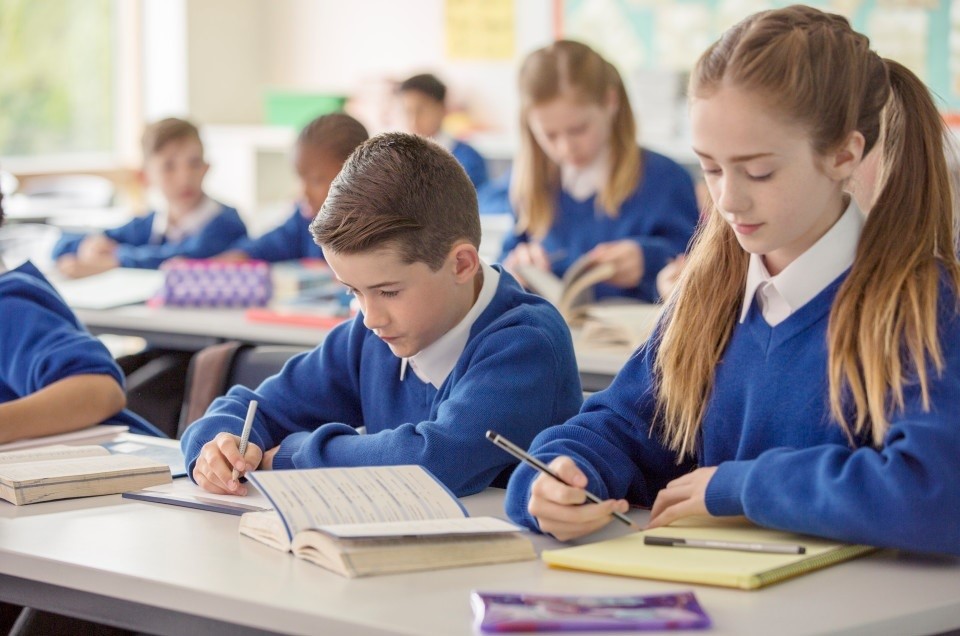
The objective of this article is to talk about Distance Learning for Traveller pupils and how to produce quality resources for your pupils who would normally be off travelling from April until November. However this year every teacher across the country, if not the world, has been producing good quality distance learning packs not for the few but for all their learners. This is a bonus for us as a service because it means teachers will all now know how to create Distance Learning materials. Alas this time will pass and fade from memory so to help support the creation of Distance Learning packs for GRT children in the future we have produced this easy to follow guide.
Learning at home
Home learning can cause many worries and concerns for Traveller families. The living conditions of many of the families are not conducive to learning. If a Traveller family comprises more than one child of school age all wanting to do written work or work on a tablet, computer etc. and the family live in a trailer, space can be an issue. Many Traveller families have difficulty with internet access depending on their living conditions as many sites do not have broadband or internet connectivity. The families may say they have internet because they have 3G or 4G on their phones but they don't have the ability to download and do work in a meaningful, straightforward way. It is therefore very important to offer the work in a paper format that can be collected safely from the school.
Some parents, not exclusively Traveller parents, have trouble with literacy and this can create a barrier to them being able to support their child’s learning. Some Traveller parents may not have attended school at all or may have had a shortened school experience or erratic school attendance. These factors can lead to them having poorly-developed literacy skills that prevent them from being able to act as parent teachers in the home following a school based curriculum. Some Traveller parents may say no to the packs telling schools they are managing fine. This can be borne out of fear of not being able to meet the school’s expectations. It helps to talk through with the parent what they are doing with the child at home and to look for learning opportunities in what they are comfortable with. This can be as simple as when they are out for a walk counting the cars or finding flowers and saying what letter they begin with. The children can collect stones and write letters or numbers on them to help them practise counting and letter-sounds.
Most Traveller families follow the rule of Mochadi. This is a cleanliness code that is strictly adhered to in the dwelling place whether it is a house, trailer or chalet. This code does not allow messy play with pens, pencils, glitter, glue, play dough, etc. inside so it is good to look for activities the children can do outside like scavenger hunts, making bug dens, making bee hotels. Many of the Traveller children will be getting educated in their culture during lockdown. Many will be given responsibilities around the home and work with the father. Often the children have animals to look after and girls will be taught cooking and homecraft.
Hampshire Ethnic Minority and Traveller Achievement Service (EMTAS) have created a Distance Learning page to signpost available free resources that may be useful. The EMTAS page is constantly growing and we would love to hear from you if you have made or found a brilliant resource that we can add - and we'll credit to you for submitting it.
The Traveller Times have also created a page of resources that may appeal to some of your Traveller learners and their families.
Fears and coding absences
Many Traveller families had great fears of
Covid 19 before the government issued guidelines for schools and this resulted
in many families removing their children from education either as an extended
absence or to electively home educate them. Some Traveller families did go travelling and asked the school to use
the ‘T’ code as they would be working as they travelled. The ‘T’ code can only be used for very
specific circumstances and travelling to avoid Covid 19 would not be a legitimate reason
to use the code. This link explains
how to use the ‘T’ code accurately.
The absence coding of Traveller children who went off school before the government closure is at the discretion of the Headteacher who may wish to seek advice from their local EMTAS or Inclusion service.
The Traveller Times team recognised early
on that many of their members and families had a great fear of this illness and
they produced a simple factual video made by Lisa Smith, a Traveller and one of
the editors of the Traveller Times, to help allay the fears of Traveller communities.
Challenges ahead
Once this is over and schools go back to some semblance of normality, the challenge of getting Traveller children to return will begin. Many families have fought battles with elders to have their children in education and now these battles will begin again. Many Traveller children who are due to transition to junior, secondary or further education may find the emotional stress and worry too much and opt instead for elective home education and work. It is vitally important to keep in contact with the Traveller parents of children in Years 2, 6 and 11 to reassure them and offer transition support. Schools should contact their local EMTAS for help and guidance with this.
Life will return to normal and our Traveller children will slowly come back into education and challenge us with their learning and sometimes their behaviour but all credit to you, when they come back through your doors – this demonstrates education is valued by our Traveller communities and that they trust you with their child; there is no greater reward than this.
Visit the Hampshire EMTAS website
Subscribe to our Blog
Digest (select EMTAS)
[ Modified: Monday, 4 May 2020, 9:37 AM ]
Comments
Anyone in the world
In this blog, Hampshire EMTAS Bilingual Assistant Eva Papathanassiou reviews Mantra Lingua’s Kitabu dual-language ebook Library.
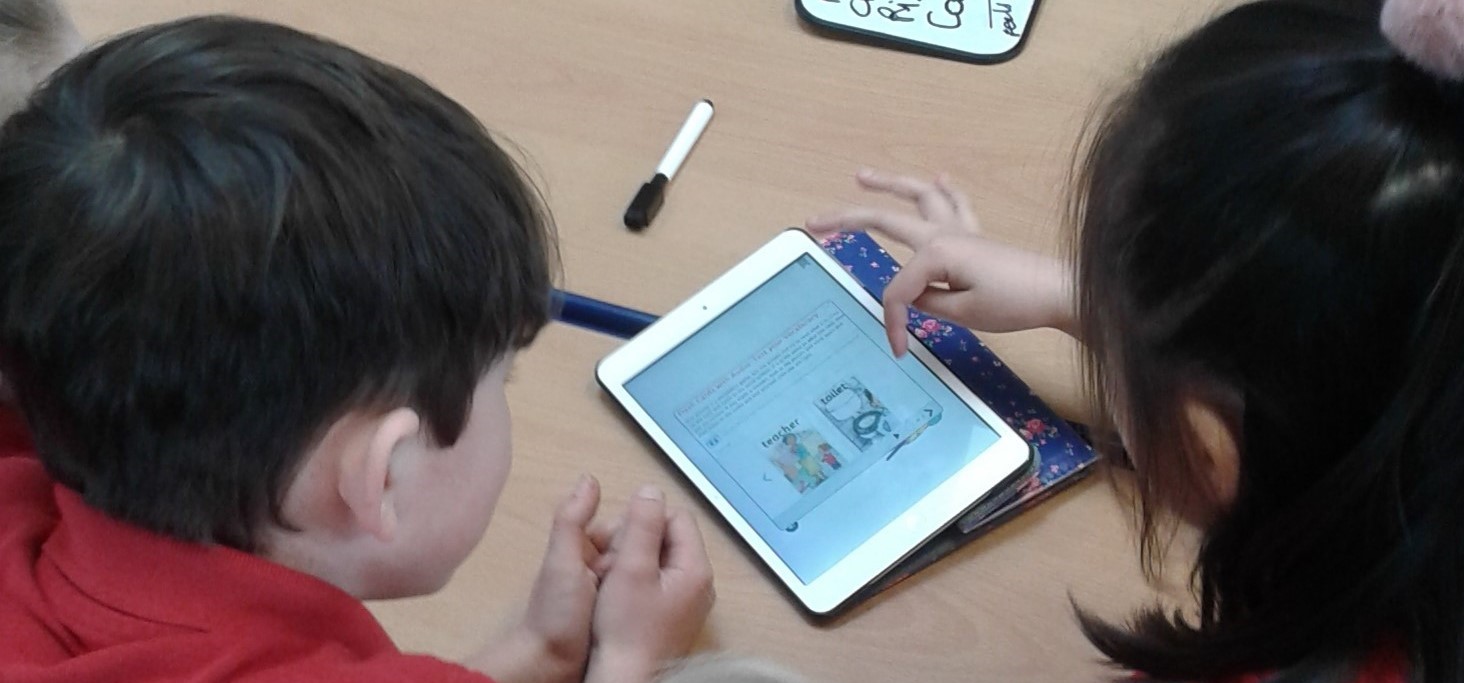
I got very excited and relieved a few months ago, when I opened my work inbox and read that I was invited to have access to an application which is literally an e-book library! Excited, because as a Bilingual Assistant, I know how any first language use, tool and resource can be extremely useful and significant for supporting children who have English as an Additional Language (EAL) to engage with the curriculum. Relieved, because this rich and diverse library would be in my hands, at any place, at any time, in less than one minute, without having to travel to our main office to get a resource or having to ask my colleagues to send to me at short notice.
I will briefly present to you this tool which is available as an app (download from Google Play or App Store) as well as through a URL on laptops and computers. I will then share with you two examples of how I have used it and why I am still so enthusiastic about it.
The Kitabu dual-language ebook Library by Mantra Lingua is a bilingual, interactive e-book library which gives you access to more than 550 books in 42 languages. The books are grouped by origin of language and type/genre. The majority of the books are fiction and folk stories for primary to early secondary (KS3) children. The fantastic thing about this library is that every e-book has both text and narration in two languages and different extra features. For example, you can create and share notes in any page, you can highlight a word or you can use a pen to draw, write or erase in any place in the text. You can also ‘tap around to hear the sound’ - tap around the page and hear the sounds of the illustration, making the book very vivid and appealing, especially to young children.
Most e-books contain a video of the story in English and follow on activities at the end for vocabulary and comprehension such as flash cards, labelling the parts of a picture, matching pairs, sequencing pictures and video observations matched with reading comprehension multi-choice questions. As you will read later on, I found the activities extremely useful to both EAL pupils and myself, especially for making the children feel more relaxed and confident, creating a rapport and for assessing first language literacy skills.
I first used the Kitabu dual-language ebook Library last autumn, when I visited a Primary School to meet and support a Romanian pupil in Year 2, Alexandru*, who had recently arrived in Hampshire. One important part of my job is to write an initial profile report of the EAL pupil by collecting important information about the child, their personality, their concerns and challenges, previous education, the level of their literacy in first language and their proficiency in English at the school starting stage (in partnership with the school teacher). Sharing the same language and culture makes the pupil’s initial profile creation a more straightforward task. However, someone who doesn’t share the child’s first language would find the process more challenging due to the lack of mutual understanding and immediate rapport that comes more naturally with someone who shares the same heritage. I don’t speak Romanian so I needed to use any tools and means available that would facilitate this task, but most importantly would enable the pupil and myself to get to know each other a little bit more and establish a bond, a relationship of trust. After a brief cooking activity with his class, it was time for me to get to know Alexandru better and assess his literacy skills. The Kitabu dual-language ebook Library came to my rescue and in two minutes, I had in front of me a selection of 8 bilingual books for Alexandru to choose from. Alexandru seemed very much at ease with the tablet and he happily took it from my hands to explore it. When he noticed the title of the books in Romanian, his face lit up; he chose the book Let’s Go to the Park/Hai să mergem în parc and we both started exploring straight away.
Alexandru tapped excitedly the different parts of the book and heard the narrative in Romanian and the different sounds of the illustration, scenes of a park full of children playing with their families. Slowly, he read some of the sentences in his first language and he heard the audio and me reading the same sentences in English, whilst he was pointing to the pictures and tapping to hear the different sounds. We moved on to the activities at the end, and we looked to the bilingual glossary with matching images from the book where we could both hear and read the words in both languages. Alexandru had the opportunity to learn some new English words, teach me some Romanian ones and correct my pronunciation and at the same time he felt happier, more relaxed and engaged. He also wrote some words in capital letters in his own language showing his writing ability, which seemed appropriate to his age and previous education. Alexandru also built his vocabulary further with different games when he labelled the parts of an image by dragging the correct word at the correct place and matching different pictures to words on the tablet and submitting his answers. This e-book enabled me to engage in an informal conversation with Alexandru, made both of us feel more at ease and get to know each other a little bit better while I had the opportunity to assess Alexandru’s first language (and partly English) listening, speaking, reading and writing skills.
A second example where I found the Kitabu dual-language ebook Library extremely beneficial was when I was asked to take over the support of a Japanese girl in Year 2 at another Primary School after one of my colleagues left our team. Hinata* had learned to write in her first language at nursery in Japan and firstly joined the school in the summer term of the previous academic year, in Year 1. The school had very successfully used Hinata’s previous skills for various writing activities and the EMTAS department had already sent a bilingual book for Hinata to read together with her classmates. Hinata appeared rather shy when she had to speak to her teacher or in front of her class and she used one word answers or gestures for communication.
During one of my visits, I was asked by Hinata’s teacher to supervise a ‘guided reading’ group activity where Hinata and three of her friends would have the opportunity to read and discuss the bilingual book, Mei Ling’s Hiccups/メイリンのしゃっくり, lent by EMTAS as a hard copy.
Hinata appeared reluctant to read out loud in Japanese but she did read each page to herself and subsequently she happily heard the rest of the group who took turns to read the text in English. Very soon Hinata appeared more relaxed and took her turn to read parts of the text in English. Everyone was impressed with her reading skills and praised her efforts. We got into a conversation about parties and Hinata was able to answer closed questions and give one-word answers, using key vocabulary from the book i.e. balloon, party, drink. Having been exposed to the Kitabu dual language ebook Library very recently, I enthusiastically searched to find any appropriate Japanese books. I was thrilled to find Mei Ling’s Hiccups as an e-book and straight away I found the follow-on vocabulary and comprehension activities. In school, Hinata together with her classmates quickly got engaged in matching pictures to words and labelling different parts of a picture. Soon Hinata appeared much more confident to demonstrate her comprehension by tapping, dragging and listening to the questions, very often volunteering her answers and at the end we went back to the book text and Hinata heard parts of the story in Japanese and read several phrases in English.
Last week, I visited the Primary School again for Hinata’s follow up visit. I was looking forward to seeing and supporting Hinata again and I remembered how much Hinata together with her classmates had enjoyed the bilingual book and its linked Kitabu activities, the first thing I did was to download another Japanese e-book from the app.
Hinata was joined by three other children and all together we went to the school library to read the new e-book, Tom and Sofia start School. Hinata was again hesitant to read in her language but she was very happy to listen to the text in Japanese, read some pages to herself and the rest of the group seemed excited to hear the story in a different language and took turns to read or hear the audio of the text in English. Very often after this activity, they asked Hinata questions like ‘is this how you say the word cool?’ repeating the last word they heard from the Japanese audio. Hinata replied by ‘yes’ or ‘no’ and she was also able to answer a few comprehension questions with one word answers with no hesitation. Afterwards, we watched the animated video of the story and we proceeded to the Video Observations follow on activity where you answer comprehension multi choice questions based on what you have just seen. Hinata’s confidence grew and very soon, she volunteered to answer the questions by choosing the correct answer on the tablet, take her turn to read small portions of the text in English together with her peers and participate in the other activities such as labelling the parts in a picture or matching pairs of images and words.
I used the Notes feature to write a comment on where and how Hinata read in the book and the children used the pen to circle different words in the e-book to demonstrate their comprehension. We highlighted more tricky words or phrases like ‘feel welcome’ and the group discussed what the phrase meant with examples. They also had the opportunity to listen to and read the definition of the word ‘welcome’ in English from an e-book. Hinata took part in all group activities contentedly and apart from learning through a new story and its key vocabulary, she was enabled to demonstrate her listening and reading comprehension and reading out loud skills confidently in front of the small group of her peers. In addition, she paid attention to the given instructions in English (read by me) or heard by the activity audio and followed what she needed to do together with her classmates, proud when she submitted a correct answer. At the end of the session, the group talked about their ‘special friends’ at home, pets or toys and Hinata told everyone that hers was a bunny.
Knowing how important it is for EAL pupils to continue using their first language in school and at home, the Kitabu dual-language ebook Library with text and audio in two languages, interactive activities and animated stories gave me an excellent opportunity to create a rapport with children who do not speak English or Greek (my own first language) and enabled me to assess their first language and English skills, through story-telling, informal chats, videos and games. Both Alexandru and Hinata felt more confident and engaged, happier to express themselves and participate, something more evident in a group setting.
The Kitabu dual-language ebook Library with its extensive bilingual library is another excellent tool for enriching children’s learning environment by use of their heritage language; something essential for confidence-boosting, self-expressing, demonstrating academic knowledge, studying more efficiently and independently and most importantly maintaining their culture and sense of identity.
*pseudonym
Find out more about Kitabu dual-language ebook Library (Mantra Lingua is offering parents of learners of EAL free access to the Kitabu dual-language ebook library until the end of August - see attachment for details)
Visit the Hampshire EMTAS website
Congratulations
to Eva who was appointed as our new Bilingual Assistant Manager since writing
her blog.
[ Modified: Thursday, 24 November 2022, 9:16 AM ]
Comments
Anyone in the world
As the situation regarding the Covid-19 outbreak continues to unfold and as schools, parents and children adapt to their new ways of working the Hampshire EMTAS team is sharing how they will keep up their support.
Hampshire EMTAS is still open for business and colleagues are working hard in the background to maintain our usual level of support:
- The Specialist Teacher Advisors are working on new material and training and are still available for support and advice via email, telephone or videoconferencing (preferably on Microsoft Teams). They are keeping a close eye on the situation and will contact colleagues booked to attend network meetings with an update. Note some events may still happen virtually so do continue to book on and look into downloading Microsoft Teams.
- CPD continues to be available through our EAL e-learning, which is free to Hampshire schools. Please contact us to sign up.
- The Bilingual Assistant Team are going to produce translations of key resources for the EMTAS website. They are also able to produce translations and voice-overs in other languages for curriculum resources to be used with those children they’ve been supporting e.g. PowerPoints to be used in teaching inputs. If teachers in schools have anything like this they want adapted for their learners, please get in touch.
- The Traveller Team are working on new resources for schools and a contingency plan for Gypsy, Roma and Traveller History Month, which for communities in Hampshire is being postponed but which promises a range of fun activities including line dancing and a postcard competition.
- Our language phone lines, SEND/EAL, ELSA and GRT phonelines are still running hence Hampshire practitioners and parents can continue to phone the EMTAS main phone number to speak to a member of staff. Note a list of Hampshire EMTAS colleagues’ email addresses will be shared with Hampshire schools via a ‘school com’ hence school practitioners will also be able to contact particular members of staff directly.
- Our Resources Manager is still processing some orders e.g. for digital subscriptions to the Young Interpreter Scheme but will be unable to send resources out to schools. Our Admin team is working remotely but is still responding to calls and emails from schools.
- We are working on publishing activities for Young Interpreters to carry out from home on our Moodle (free access). Note that a decision will be made about the Basingstoke Young Interpreters Conference after the Easter break.
Finally, we are keen to continue posting blogs every other week but acknowledge our original schedule will need to be tweaked to ensure articles are pertinent to our readers in these highly unusual circumstances. As far as possible our blogs will include useful links for digital resources and advice to support you and families throughout the pandemic. Please subscribe to the blog digest to stay up to date (select EMTAS on the sign up form).
We will start here with a non-exhaustive list of suggested resources which school practitioners are encouraged to share with parents where appropriate. We would like to draw your attention particularly to the Kitabu Dual Language ebook Library. A review of this library written by Hampshire EMTAS Bilingual Assistant Eva Papathanassiou is coming very soon. In the meantime, Mantra Lingua is offering parents of learners of EAL free access to the library. Please contact us for details which you can share with your families.
List of resources
Coronavirus information in other languages
- Doctors of the World
- World Health Organisation (WHO) – choose your language in the top right-hand corner
- Translated posters for hygiene tips from New South Wales Health (Australia)
Ebook libraries
- Download eBooks, eAudiobooks and eMagazines for free from Hampshire libraries
- Ebooks and audiobooks for children currently available for free at World Book Online
- Kitabu Dual Language ebook Library (blog coming soon)
- Free streaming for children on Audible. Includes stories in six languages
- International Childrens Digital Library
Resources for parents and their children
- Free resources for Young Interpreters via the Hampshire EMTAS Moodle
- National Literacy Trust – Parent Zone
- Secondary resources for home learning with the English and Media Centre
- Free British Sign Language course for under 18s
- Free home learning resources for Secondary students from the British Library Learning
- Collaborative Learning Project - Collaborative Activities are ideal for learning at home. You collaborate to make up an activity. You collaborate to do the activity. Then you sanitise the activity and pass it on to another parent or carer
- BBC Bitesize – cross-phase and cross-curricular learning resources
- BBC Programmes categorised as learning
- #stayathomestorytime - 6pm on Instagram – a daily children’s story by Oliver Jeffers
- Jack Hartman on Youtube - maths and English with physical exercises to do
- Topmarks - resources for KS1 and KS2
- The Confident Teacher – weekly themed activities and resources
- @littlelessons20 on Twitter. Two video lessons each day suitable for primary pupils
- Kelly’s Home Centre on Facebook - live free virtual cooking classes for children aged between 6 and 14
- Cambridge Assessment – offering their ResourcePlus suite, with videos and teaching resources, for free. Secondary phase
- EAL journal – for further links of suggested websites and activities
Culture
- The Royal Opera House - programme of free online content for the culturally curious at home
- ‘A list of free, online, boredom-busting resources’ from Chatter Pack. Includes links to virtual tours of museums and galleries, links to concerts and much more
- Snow Mouse – a wintry 40-minute tale for the under-fours
Online learning platforms
- Education City - resources to support literacy, numeracy and cross curricular work (including a Learn English module)
- Learning Village – blended learning materials for EAL learners
Technology
- Parents can order a free 14-day trial C-pen to be sent home in order to support their children's literacy.
Fitness and wellbeing
- Live PE workouts each morning with Joe Wicks, Body Coach, on Youtube
- PE workouts on demand with Les Mills Born to Move
CPD for school staff
- EAL elearning
- Blog
- Hampshire EMTAS website
- Bell Foundation
- Naldic
Visit the Hampshire EMTAS website
Subscribe to our Blog Digest (select EMTAS)
[ Modified: Tuesday, 24 March 2020, 5:14 PM ]
Comments
Anyone in the world
By Hampshire EMTAS Traveller Teaching Assistant Helen Smith
During the summer and autumn terms the EMTAS Traveller Team is always busy supporting pupils through the transition period. Historically, transition was focused on the transition from Year 6 to Year 7 and although this still remains the bulk of our work, we have now developed programmes to support Gypsy, Roma and Traveller (GRT) pupils from Year 2 – Year 3 (when a child is moving from an Infant school to a Juniors) and into Year R.
The period between Year 6 and Year 7 is the time when high numbers of GRT pupils are withdrawn to be Electively Home Educated (EHE); on average we lose about 30% of our pupils to EHE during this time. We are working hard with pupils, families and schools to reduce this number. During the spring term we meet to review the data and identify pupils that may be at risk of not successfully transferring to secondary school. There is a variety of identifiers for such pupils, which include:
no application for a secondary place made
low or erratic attendance
older siblings that are already EHE
children whom we have previously supported who we know have reservations about secondary school
SEND issues.
We then begin transition work by contacting schools that have pupils on roll who have not made secondary applications and we offer our help. We may ask school to chase up the application and find out from parents if they need help or we may meet with school and the family to talk through any issues and barriers. Our position on school applications is always to make the application, even if you are not sure your child will be staying in school, then give it a go even if it’s just for a term.
Our transition programme is for GRT children who have secured a secondary place. It takes place during the summer term and can be delivered over a period of between 2 and 4 weeks. It includes a follow up visit in the child’s new school in the autumn term. The aim of the programme is to encourage the children to want to start thinking more positively about secondary school and the opportunities it can give them. The programme focuses on post-16 aspirations, necessary school equipment, timetables and routines and any worries, questions and concerns. The follow up can sometimes just be a phone call to the school to check that the child has transitioned and make sure there aren’t any problems. Ideally this would then be followed by a visit to talk to the child and help with any issues they may raise.
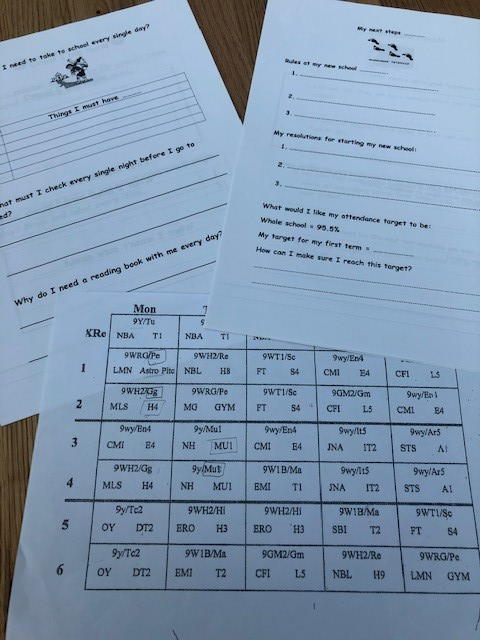
Last year we piloted a programme to help transition from Year 2 to Year 3 where children are transferring from an infant school to a junior school, i.e. it is not aimed at children who are attending a primary school. Due to time restraints, we target this offer at children who we think may struggle to settle into their new junior school. This can be because:
they have already attended several schools
they have only recently settled into their current infant school
there are SEND issues
they are an anxious child or parent
they have low or erratic attendance.
The Year 2 – Year 3 programme comprises three sessions in the infant school and two sessions in the junior school. The programme centres around similarities and differences between the two schools and is aimed at reassuring the child about any worries they may have about their new setting.
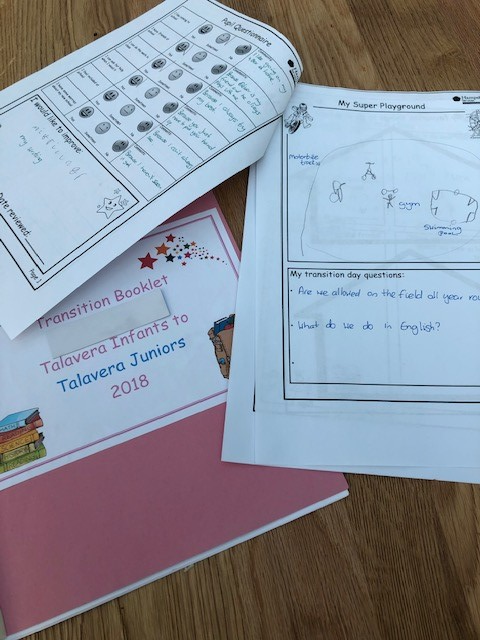
In 2018-19, we piloted a transition programme for children transferring from pre-school to Year R, or into Year R having not attended a pre-school. Again, these will be children who have been identified by us, the school, pre-school or parent as needing extra help to settle into school. This may be because:
the child has not attended any pre-school setting
the parent is anxious about the child starting school
the attendance of siblings has been erratic or low
there are SEND issues
extra support has been recommended by an outside agency.
The bulk of the programme takes place once the child arrives in the infant school, but ideally begins with a meeting with school/pre-school and parent in the summer term to discuss any issues and help with ideas for making sure the child is school ready. The programme involves one of the EMTAS GRT persona dolls. The doll and I visit the school during the first couple of weeks. The children show us around their school and share some of their school activities and routines. Our visits are recorded in the doll’s journal using photos and the children’s work. The persona doll and I will then visit again in the spring and summer terms and check on the child’s progress.
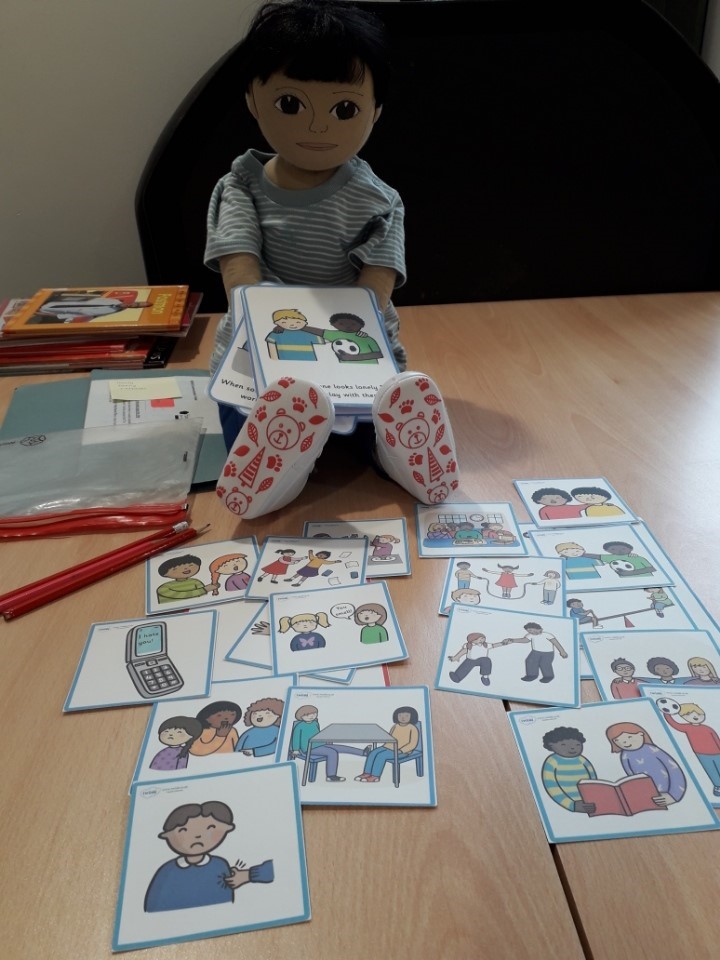
The aim of the transition is to make the experience as positive as possible to help aid retention in all phases, especially secondary. As a team, we believe the better the experience our GRT children have early in life, the more positive an influence this can have on their attitude to school and education, which can pay dividends in the secondary phase. The majority of Year 6 GRT pupils with whom we have worked over the last 4 years are still in school and about to enter their GCSE year. This is testimony to the dedication, flexibility and perseverance of our team, the GRT children, their families and in no small part the schools.
If you have a GRT pupil that you think would benefit from EMTAS
transition support, please use the website to make a referral in the normal way, ideally by the beginning of the Summer term.
Additional information pertaining to GRT support and staff training can also be
found on our website.
Meet Helen Smith and persona doll Jesse at the next Basingstoke network meeting on March 23rd at Marnel Infant School. Booking essential. Further details on our website's training tab.
Visit the Hampshire EMTAS website
Subscribe to our Blog Digest (select EMTAS)
[ Modified: Friday, 13 March 2020, 11:06 AM ]
Comments
Anyone in the world
[ Modified: Wednesday, 26 February 2020, 10:14 AM ]
Comments
Anyone in the world
The Hampshire EMTAS Specialist Teacher Advisors have been supporting schools to complete the EAL Excellence Award for over a year now. Many schools have successfully earned their Bronze and Silver awards and are already working hard to achieve the next level up. Working with schools to drive EAL practice and provision forward through the EAL Excellence Award has highlighted areas of support which the EMTAS Teacher team has been keen to address.
One particular aspect of EAL good practice which many schools have had to consider is the use of first language as a tool for learning. Whilst most could confidently say that pupils felt comfortable speaking their languages at school (a feature evidenced at Bronze level), EAL co-ordinators felt that pupils could be better encouraged to use their languages to access the curriculum in the classroom (a feature evidenced at Silver level). In response to this, the EMTAS Teachers have been working closely with their schools to introduce ideas and strategies to support this and they are now keen to share their work with the EAL community.
Discover our brand new materials which consist of a narrated animation (below) with supporting material you will find attached to this blog: a transcript, activities based around the animation and an aide-mémoire summarising key strategies. Our work is still ongoing with a brand new piece of EAL elearning currently under development – watch this space!
Visit the Hampshire EMTAS website
Subscribe to our Blog Digest (select EMTAS)
[ Modified: Wednesday, 5 February 2020, 12:16 PM ]
